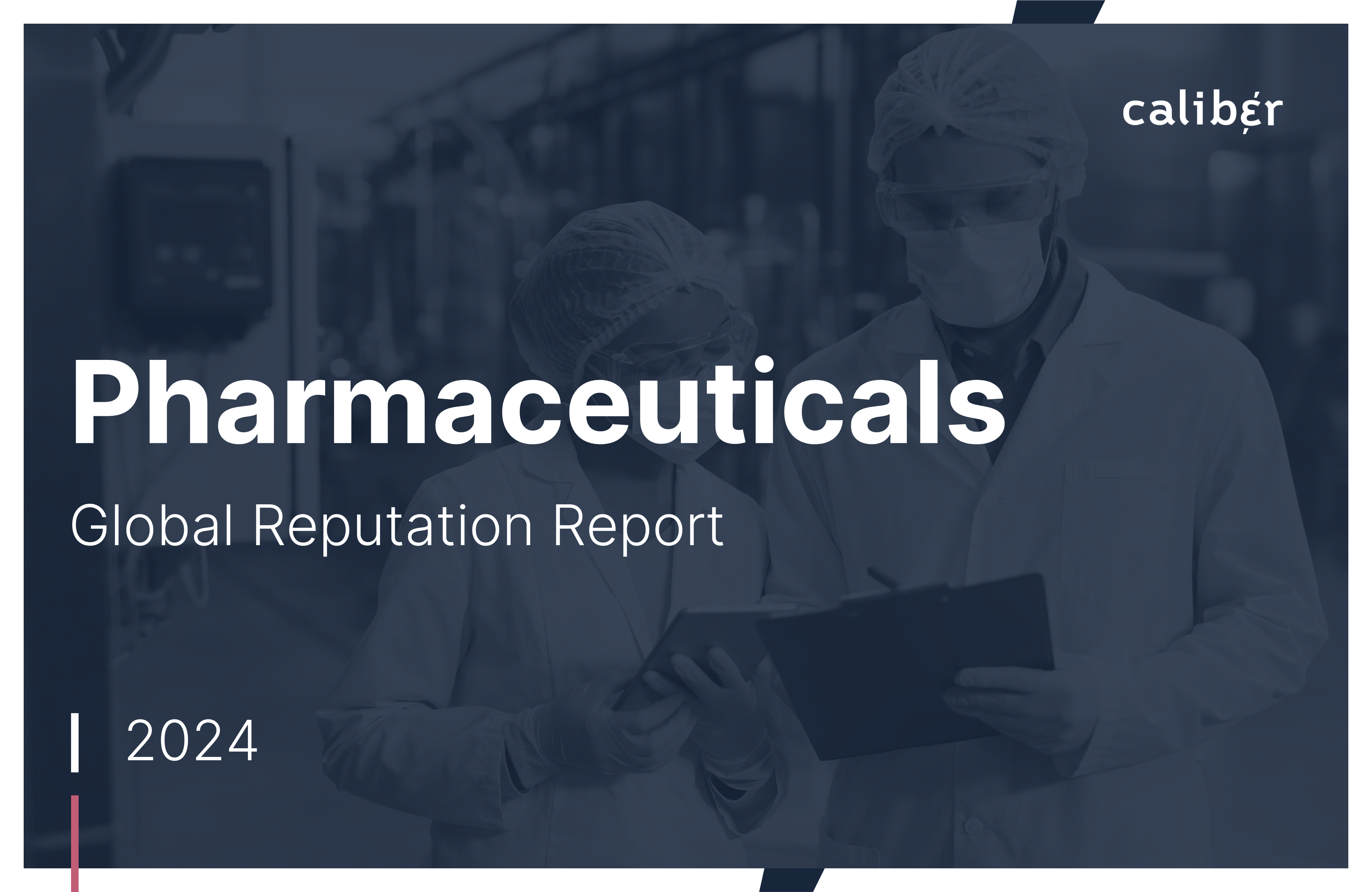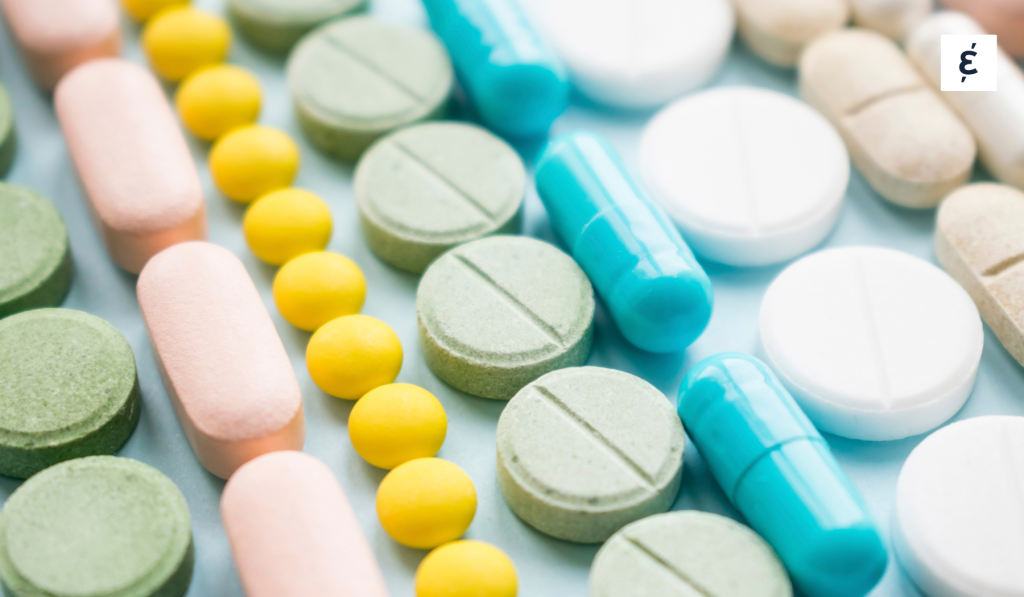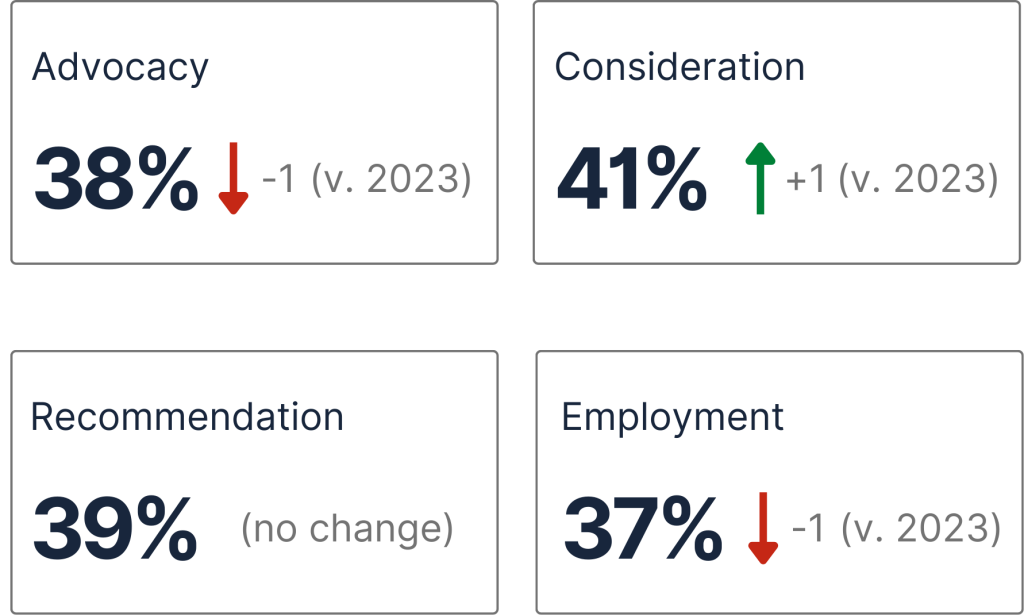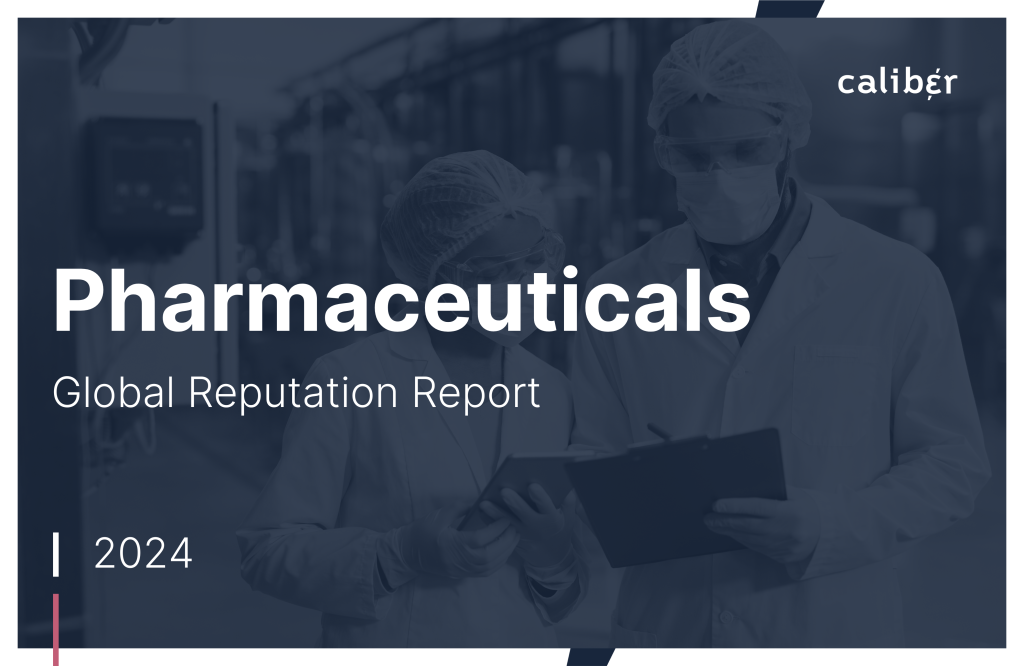

In an age where health innovation moves at lightning speed, public trust in the pharmaceutical industry has never been more important — or more scrutinized.
While size and revenue still dominate headlines, a growing body of evidence suggests that being big doesn’t always equal being trusted.
In this article, we’ll explore:
Who the biggest pharmaceutical companies in the world are today
Which companies lead in public trust and reputation
The unique reputational challenges tied to the booming market for weight-loss drugs
The pharmaceutical industry plays a critical role in global healthcare, driving the development of life-saving medications and innovative treatments that improve the quality of life for millions of people worldwide.
The world’s top pharmaceutical companies are at the forefront of medical advancements — from creating vaccines that prevent deadly diseases to developing therapies that manage chronic conditions.
Ongoing innovation within the sector not only enhances individual health outcomes but also strengthens the broader public health infrastructure, helping societies manage both existing and emerging health challenges.
Beyond their direct impact on health, the world’s leading pharmaceutical companies are also major economic drivers. They generate significant employment opportunities and stimulate economic growth through extensive research and development (R&D) activities.
The industry’s investments in cutting-edge technologies and clinical trials contribute to scientific progress that benefits adjacent sectors, including biotechnology and medical devices.
Moreover, the sector’s global reach, with top pharmaceutical companies operating across multiple markets, fosters international trade and collaboration, further reinforcing global economic stability.
This analysis is based on the 2024 Global Reputation Report from Caliber, as well as official industry data.
When people refer to the “top pharmaceutical companies,” they usually mean those with the highest annual revenues — companies that lead the global market in terms of sales, R&D investments, and global reach. These firms are often referred to as Big Pharma and represent major players in therapeutic areas ranging from oncology to vaccines.
According to CompaniesMarketCap.com, the leading pharma companies in 2024 have reported revenues ranging from $35 billion to over $370 billion — driven by high-demand therapies in oncology, immunology, vaccines, and metabolic diseases.
Rank | Company | Revenue |
|---|---|---|
1 | CSV Health | $378.96 B |
2 | Walgreens Boots Alliance | $151.94 B |
3 | Johnson & Johnson | $89.33 B |
4 | Sinopharm | $80.09 B |
5 | Roche | $69.07 B |
6 | Merck | $63.92 B |
7 | Pfizer | $62.46 B |
8 | AbbVie | $56.33 B |
9 | Astra Zeneca | $54.98 B |
10 | Novartis | $53.22 B |
Top 10 biggest Pharmaceutical Companies in the World by Revenue, according to Companies Market Cap data in (Last updated in May, 2025)
The United States continues to dominate the global pharmaceutical landscape — home to giants like Pfizer, Johnson & Johnson, and Merck & Co.
Switzerland and Germany also hold strong positions through companies like Roche, Novartis, and Bayer, while the UK contributes with GSK and AstraZeneca.
Meanwhile, Denmark punches well above its weight thanks to Novo Nordisk — the company behind the blockbuster weight-loss drug Wegovy. Although Novo Nordisk didn’t meet the global familiarity threshold to appear in Caliber’s overall Trust & Like Score ranking, it was the top-ranked pharmaceutical company in Denmark by public perception, earning high marks for Innovation and Inspiration.
The Caliber 2024 Global Reputation Report tells a different story — one focused not on revenue, but reputation.
Using a proprietary metric called the Trust & Like Score (TLS), Caliber measured public perception across 13 countries and found that some of the largest companies are not necessarily the most trusted.
Our 2024 global reputation report shows, the world’s top pharmaceutical companies don’t boast particularly strong reputations. The pharma sector got an overall Trust & Like Score — our chief reputational metric — of 65.
Of the 16 sectors that Caliber tracks, pharma has one of the worst reputations, equal to telecoms and better only than the energy sector.
(Note: A company’s Trust & Like Score is based on the degree to which survey respondents say they trust and like that company, meaning the sectoral score is the average of all companies.)
The bad news for the global pharmaceutical sector is that it was perceived less favorably than it was in 2023.
Globally, too, perceptions of several brand and reputation attributes declined in 2024.

As the graphic above shows, the world’s top pharmaceutical companies were rated less favorably, on average, in terms of their Differentiation, Inspiration, Offering and Integrity, while their Authenticity, Relevance, and Leadership scores remained the same.
There’s a similar pattern to the levels of likely stakeholder behavior.
While stakeholders were slightly less likely to say something positive about the world’s top pharmaceutical companies (Advocacy) or consider looking for a job in the sector, they were as likely to recommend the sector and slightly more likely to consider buying products or services from the world’s top pharmaceutical companies.

The good news for the world’s top pharmaceutical companies is that Innovation remains the sector’s reputational attribute with the highest score. It’s also the only attribute to get a ‘High’ score, not an ‘Average’ one.
This makes a lot of sense, given that pushing the limits of scientific knowledge — and producing potentially lifechanging medicine — is the core of the industry’s work, especially in a year that’s seen the growing popularity of drugs targeting diabetes and obesity, plus promising reports of experimental drugs targeting Alzheimer’s disease and cervical cancer.
The timeline below shows how the average Trust & Like Score (TLS) for companies in our pharmaceutical index changed in the past 12 months. The sector’s reputation was often volatile — plummeting to a TLS of 60 in January 2024 before soaring to 74 weeks later.
While it’s hard to say what influenced stakeholder perceptions, factors may have included the media coverage indicated by the headlines below.
Caliber’s determination of the world’s top pharmaceutical companies is based on an analysis of of their Trust & Like Scores.
There is ample proof that stakeholder behavior is linked to the degree to which people trust and like a company. Therefore, the Trust & Like Score is the key element used by Caliber in measuring the strength of a company’s brand and reputation.
To better explain the meaning of the Trust & Like Score, we explore several attributes related to Brand, Reputation, Behavior and ESG, as well as information on demographics, professional background and the touchpoints through which stakeholders interact with companies.
For our 2024 global reputation report on the pharmaceutical industry, we asked respondents in 13 countries to rate 34 pharmaceutical companies, selected based on their global market capitalization being at least 25 billion USD at the end of 2023.
However, we first screened respondents for awareness and familiarity, asking them to pick companies they recognized from a series of logos and then, for the ones they selected, to gauge how familiar they were with them on a 1-7 scale, where 1 meant “not at all familiar” and 7 meant “very familiar”.
Only respondents who picked 4 and above were invited to rate the companies in question. This process meant we could see how familiar respondents were with the 34 companies in the survey.
One consequence of this is that only eight companies cleared our standard 15% familiarity threshold. Most of the 34 companies we included in the survey had low familiarity levels — which is typical for B2B industries and in the pharmaceutical sector, where the product brands are more known to patients and consumers.
Several companies that might be thought of as “household names” fell below our threshold. They include Novo Nordisk (14% global familiarity), BioNTech (12%), Sanofi (10%), Eli Lilly (9%), Takeda Pharma (8%), Merck & Co, Merck KGaA and Boehringer Ingelheim (all 7%).
Though unfamiliar to the public, the companies are known to “industry insiders” such as buyers, payers, suppliers, healthcare professionals, employees, analysts, and journalists — which can result in high Trust & Like Scores.
Rank | Company | Trust & Like Score |
|---|---|---|
1 | Roche | 66 |
2 | Novartis | 64 |
3 | GSK | 64 |
4 | Bayer | 64 |
5 | Johnson & Johnson | 63 |
6 | Pfizer | 57 |
7 | Moderna | 56 |
8 | Astra Zeneca | 52 |

Headquarters: Basel, Switzerland
CEO: Thomas Schinecker
Trust & Like Score: 66
Roche, a Swiss multinational healthcare company, is the world’s top pharmaceutical company by reputation.
Roche’s leadership in the industry is largely due to its pioneering work in oncology, immunology, and diagnostics. The company has a strong portfolio of cancer treatments, including the blockbuster drugs Herceptin and Avastin.
Beyond oncology, Roche has made significant strides in personalized healthcare, focusing on diagnostics and targeted therapies that improve patient outcomes.
Roche’s commitment to innovation is underscored by its substantial investment in research and development, with billions of dollars allocated annually to advance its pipeline of new drugs.
The company’s leadership in diagnostics has also been crucial during the COVID-19 pandemic, as Roche developed and distributed highly accurate COVID-19 tests worldwide.
Headquarters: Basel, Switzerland
CEO: Vasant Narasimhan
TLS: 64
Novartis, another Swiss pharmaceutical giant, is the world’s second-highest ranked pharmaceutical company by reputation. Known for its diverse product portfolio, Novartis operates in several therapeutic areas, including oncology, immunology, neuroscience, and ophthalmology.
The company is particularly recognized for its innovative treatments in oncology, such as Kymriah, the first CAR-T cell therapy approved by the FDA for certain types of cancer.
In addition to its focus on innovation, Novartis has been a leader in making advanced therapies accessible to patients worldwide. The company has also been at the forefront of digital health, leveraging technology to enhance drug development and patient care.
Novartis’s commitment to sustainability and corporate responsibility further strengthens its position as a top pharmaceutical company.
Headquarters: Brentford, United Kingdom
CEO: Emma Walmsley
TLS: 64
GSK, a British multinational, is another major player in the global pharmaceutical industry. GSK’s strength lies in its broad portfolio of vaccines, respiratory medicines, and HIV treatments.
The company is a leader in vaccine development, with a strong focus on immunology and infectious diseases. GSK’s vaccine for shingles, Shingrix, is one of the most successful vaccines in recent years.
GSK has also made significant investments in research and development, particularly in the areas of oncology and immunology. The company’s innovative pipeline includes promising treatments for cancer, respiratory diseases, and infectious diseases. GSK’s focus on global health is evident in its commitment to developing vaccines and treatments for diseases that disproportionately affect low-income countries.
Headquarters: Leverkusen, Germany
CEO: Bill Anderson
TLS: 64
Bayer, a German multinational, is a key player in the pharmaceutical and life sciences industries. The company’s pharmaceutical division is known for its contributions to cardiovascular health, oncology, and women’s health.
Bayer’s blockbuster drugs include Xarelto, an anticoagulant, and Eylea, a treatment for age-related macular degeneration.
In addition to its pharmaceutical division, Bayer is a leader in consumer health and agriculture, with a strong presence in over-the-counter medications and crop science.
Bayer’s commitment to sustainability and innovation is reflected in its ongoing investment in research and development, as well as its focus on developing new treatments that address unmet medical needs.
Headquarters: New Brunswick, New Jersey, USA
CEO: Joaquin Duato
TLS 63
Johnson & Johnson, an American multinational, is one of the largest and most diversified healthcare companies in the world. The company’s pharmaceutical division, Janssen, is a leader in several therapeutic areas, including oncology, immunology, neuroscience, and infectious diseases.
Johnson & Johnson’s COVID-19 vaccine, developed by Janssen, played a significant role in the global response to the pandemic.
Beyond its pharmaceutical division, Johnson & Johnson is a major player in medical devices and consumer health products.
The company’s commitment to innovation is evident in its substantial investment in research and development, as well as its focus on addressing global health challenges.
Headquarters: New York City, New York, USA
CEO: Albert Bourla
TLS: 57
Pfizer, an American pharmaceutical giant, is known for its wide range of medications and vaccines. The company gained global recognition for its rapid development of one of the first COVID-19 vaccines, in partnership with BioNTech.
Pfizer’s vaccine was one of the first to receive emergency use authorization and has been a cornerstone of global vaccination efforts.
In addition to its COVID-19 vaccine, Pfizer is a leader in several therapeutic areas, including oncology, immunology, and cardiovascular health. The company’s commitment to innovation is reflected in its strong pipeline of new drugs and its focus on developing treatments for unmet medical needs.
Headquarters: Cambridge, Massachusetts, USA
CEO: Stéphane Bancel
TLS: 56
Moderna, a relatively new player in the pharmaceutical industry, gained global prominence for its mRNA-based COVID-19 vaccine.
The success of Moderna’s vaccine has propelled the company into the ranks of the top pharmaceutical companies worldwide. Moderna’s mRNA technology has shown great promise not only in vaccines but also in potential treatments for a range of diseases, including cancer and rare genetic disorders.
Moderna’s commitment to innovation is evident in its ongoing research and development efforts, with a focus on leveraging its mRNA platform to develop new treatments and vaccines.
The company’s rapid response to the COVID-19 pandemic demonstrated the potential of mRNA technology to revolutionize the field of medicine.
AstraZeneca, a British-Swedish multinational, is another top pharmaceutical company with a strong presence in the global market.
AstraZeneca’s product portfolio includes treatments for oncology, cardiovascular diseases, respiratory conditions, and immunology.
The company gained significant attention for its COVID-19 vaccine, developed in collaboration with the University of Oxford.
In addition to its COVID-19 vaccine, AstraZeneca is a leader in oncology, with a strong pipeline of cancer treatments.
The company’s focus on innovation and sustainability is reflected in its substantial investment in research and development, as well as its commitment to addressing global health challenges.
Many companies are ranked in the top three by Trust & Like Score in several markets, including:
Bayer (top in China, Spain, the US and the UK, second in Denmark, third in the
Netherlands, Sweden, and Switzerland)
GSK (top in Sweden and the Netherlands, second in the UK, third in Belgium)
Roche (top in Belgium and France, second in Switzerland, third in China and Germany)
Johnson & Johnson (top in Brazil and Switzerland, second in the US, the Netherlands and Spain, and third in Japan)
Several companies do well in their home markets. Besides Roche and GSK coming second in Switzerland and the UK, respectively, Novo Nordisk is the top-ranked company in Denmark, Boehringer Ingelheim is number one in Germany and Sanofi ranks second in France.
Finally, a glance at the two highest-scoring attributes for each top-ranked company shows three standout attributes — Inspiration, Offering, and Innovation
There’s a growing divergence between commercial dominance and reputational leadership. According to Caliber’s report:
The past year has been a landmark period for the pharmaceutical industry, dominated by headlines about blockbuster weight-loss drugs such as Wegovy and Zepbound that promise to transform lives and redefine standards of health and wellness.
These medicinal breakthroughs have captured the public imagination, offering new hope to millions struggling with obesity and related health issues.
The narrative around these drugs is far from straightforward, though. Alongside the enthusiasm, there are concerns about their broader impact on other industries, including fitness and food, that may see shifts in demand.
The popularity of weight-loss drugs has also sparked debates about the impact on the body positivity movement and the ethics of promoting pharmaceutical solutions to weight management.
Financial considerations loom large, too, with the high cost — and limited supply — of these cutting-edge treatments posing challenges for healthcare systems and patients alike.
At the same time, the manufacture of these drugs has led to a decline in the production of essential medications such as insulin, underscoring the need for balanced innovation that ensures equitable healthcare for all.
From a reputational standpoint, what’s especially interesting here is that the two companies that don’t have a product on the market are relatively well associated with weight-loss drugs (Pfizer and AstraZeneca), while the two that do (Novo Nordisk and Eli Lilly) are flying under the radar.
Ordinarily, companies entering a market later can learn from others’ mistakes. But Pfizer and AstraZeneca are already in the game, whether they like it or not — which suggests they may need to help the sector win this narrative sooner rather than later.
According to Caliber:
55% of respondents see weight-loss drugs as a “quick fix”
34% cite cost as a major concern
Only 22% believe pharmaceutical companies are helping solve a global health crisis
12% believe they’re taking advantage of it
Surprisingly, Pfizer and AstraZeneca, which don’t yet have approved obesity drugs, are more widely associated with them than Eli Lilly and Novo Nordisk. In fact:
Only 20% named Novo Nordisk
Only 12% named Eli Lilly
In the US, Pfizer topped brand recall for weight-loss drugs
The rise of GLP-1 drugs has sparked ethical debates around:
Body positivity vs. pharmaceutical dependency
The high cost and limited accessibility of new treatments
Supply shortages of other medications like insulin
The takeaway? Pharma companies must walk a fine line between innovation and equity, treatment and profit.
From the Caliber report and broader market trends, key industry challenges include:
Cost pressures from healthcare systems and governments
Rising scrutiny around drug pricing and access
Pressure to prove ESG performance and transparency
Managing supply chain shortages and public expectations
Trust remains fragile. While innovation is the industry’s most praised attribute, only a minority of consumers believe pharma companies act in the public interest. This “trust gap” could widen without stronger efforts in communication, ethics, and accessibility.
The world’s top pharmaceutical companies play a critical role in advancing global health through innovation, research, and the development of life-saving medications.
As the pharmaceutical sector continues to grow in influence and impact, reputation is emerging as the ultimate competitive advantage. Companies that lead in trust, transparency, and innovation will shape the future of global health — not just those with the biggest balance sheets.
Companies like Roche, Novartis, GSK, Bayer, Johnson & Johnson, Pfizer, Moderna, and AstraZeneca are at the forefront of this industry, leading the way in developing new treatments and addressing global health challenges.
Their commitment to innovation, sustainability, and corporate responsibility ensures that they will continue to be leaders in the pharmaceutical industry for years to come.
According to 2024 revenue data on Companies Market Cap, the top companies include CSV Health, Wallgreens Boots Alliance, Johnson & Johnson, SinoPhram, Roche, Merck, Phizer, AbbVie, Astra Zeneca and Novartis.
Based on Caliber’s Trust & Like Score, the most trusted companies this year include Roche, Novartis, GSK, and Johnson & Johnson. These rankings are based on public perceptions across 13.
The largest pharmaceutical company in Denmark is Novo Nordisk.
Headquartered in Bagsværd, Denmark, Novo Nordisk is a global leader in diabetes care, hormone replacement therapy, and more recently, obesity treatments. The company is best known for its blockbuster drugs Ozempic (for type 2 diabetes) and Wegovy (for weight loss), which have driven massive global demand and revenue growth in recent years.
As of 2024, Novo Nordisk is not only Denmark’s biggest pharmaceutical company but also one of the most valuable companies in Europe by market capitalization. It operates in over 80 countries and serves millions of patients worldwide.
In Caliber’s 2024 Global Reputation Report, Novo Nordisk ranked as the most trusted pharmaceutical company in Denmark, earning top scores for Innovation and Inspiration — reflecting strong national brand equity and public approval.
Big Pharma” refers to the largest pharmaceutical companies with significant influence over global drug development and healthcare policy. While these firms are recognized for medical breakthroughs, they are often scrutinized for high pricing, lobbying power, and ethical practices.
Trust in the pharmaceutical industry remains fragile. While innovation is a strong point, only 22% of global respondents believe pharma companies are helping solve a health crisis, and 12% think they are exploiting it — highlighting a significant perception gap.
Blockbuster drugs like Wegovy and Zepbound have generated headlines and profits — but also concern. Many view them as expensive “quick fixes,” raising questions about access, marketing ethics, and their impact on broader health narratives.
The reputation of the pharmaceutical industry is complex and often polarized — reflecting a tension between its scientific contributions and public skepticism.
According to Caliber’s 2024 Global Reputation Report, the global Trust & Like Score for the pharma sector declined slightly to 65 (down from 67 in 2023), signaling that public trust in pharma remains average, with notable regional and company-level differences.
Only 22% of global respondents believe pharma companies are helping solve a global health crisis, while 12% think they are taking advantage of it — highlighting a significant reputational gap.
Rebuilding trust in the industry will require greater transparency, ethical leadership, and public engagement, especially as companies expand into new therapeutic areas like weight-loss drugs, gene therapies, and AI-driven medicine.

© 2024 Group Caliber | All Rights Reserved | VAT: DK39314320